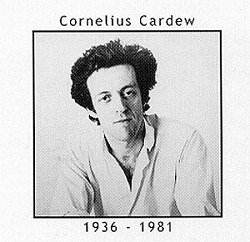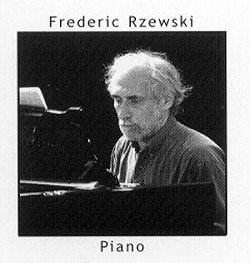This bizarre time-warped event merits notice as an unforgotten strand in the history of 20th Century British Music, preserved in aspic or amber.
Survivors of the Scratch Orchestra, and other associated groups active in the late '60s and '70s, attracted a full house to the platform and auditorium of Conway Hall for a memorial concert celebrating the wide influence of Cornelius Cardew, former assistant to Stockhausen, later a Cage devotee; an influential, politically committed composer, killed by a hit and run driver in December 1981. For a contemporaneous experience of a Cardew 'concert' in 1970, see my Appendix.
Paragraph VI of The Great Learning had a dozen musicians of his former Scratch Orchestra (formed in 1968 to make new and experimental music open to non-musicians and ordinary people) sitting on the floor and improvising very solemnly to strict instructions. To the uninitiated, it looked like a group of well-behaved grown up nursery school children making funny noises. At the Huddersfield Festival's Cardew Memorial Concert, with some of the same performers, Paul Conway in The Independent found Cardew's Schooltime Compositions, with pianist Sarah Walker clapping her hands as if to say "That's enough, children", an experiment too far. Impossible to ignore, Cardew and his colleagues were also represented in a more positive light in the Flanders Festival, and something of Cardew's music for non-musicians aesthetic flourishes in that aspect of the diverse and fruitful new music for amateurs movement spearheaded by COMA.
At Conway Hall, Frederic Rzewski and John Tilbury, brilliant pianists and loyal Cardew advocates, played piano music representing his changing musico-political philosophies. Tilbury started with pieces deriving from folk songs about the 1798 Irish rebellion. A nod towards complexity in the experimentally notated February Pieces, a compendium of avant-garde techniques (a style against which Cardew later reacted), led into a free improvisation realisation of The Tiger's Mind with Keith Rowe (electronic guitar) and innovative percussionist Eddie Prévost of AMM. An embarrassing, aesthetically null set of Revolutionary Songs (Smash the Social Contract, etc) gave a flavour of English Communism in the '70s. The participants who belted out the banal verses with their faux-naïve accompaniments had been one-time activists in workers demonstrations. Thirty years on, the voices of Vicky Silva and Chris Thompson were decidedly frayed, and they are better heard on recordings made in the mid-70s for vinyl LPs which were never issued, only now released on CD: WeOnlyWantTheEarth (musicnow MNCDX004). Rzewski played the We Sing the Future variations, which are given in an impressive unedited single take (with two improvised cadenzas) on a desirable CD of the same title (New Albion Records NA116).
Peter Grahame Woolf
APPENDIX: Francis Routh on Cardew's Scratch Orchestra in April 1970
Several groups have been started in the 60s for the presentation of avant-garde works - - - the ultimate so far in this direction (though who can say what the future holds in store?) is Cornelius Cardew’s ‘Scratch Orchestra’? which he founded in 1969.
Cardew, who was born in 1936, is the John Cage of British music. Indeed, after studying electronic music in Cologne (1957/8), Cardew was associated with Cage and David Tudor, and also made his acquaintance with the music of Christian Wolff and Morton Feldman. His compositions bear deceptively traditional titles, but there any resemblance to traditional procedures ends; more often than not the scores contain lengthy instructions on how to decipher the otherwise unintelligible symbols. Every work is for him a fresh experiment, and every performance too. The only thing, for instance, that is determinate about Treatise is that no performance will bear audible relationship to any other performance. The score consists of 193 pages of free graphics, without a single symbol whose meaning has been agreed in advance. You can sing it, play it on any instrument, in any order, backwards or forwards, in part or in whole; you can contemplate it in silence, or act it; but for the final result Cardew disclaims all responsibility. ‘My intention’ he says, ‘is that the player should respond to the situation.’
But what of the audience? An artistic response on the part of the listener has always been the sine qua non of any music which lays claim to the stahls of art. If the nihilistic avant-garde composer dissociates himself from the performer, does he also disclaim any concern for the audience? Suppose that a listener were to trespass on a meeting of the Scratch Orchestra in the fond and innocent expectation that he was going to hear a concert:
Place: St. Pancras Assembly Rooms
Date: 2nd April 1970. Thursday evening, 7.50 p.m.
Enter concertgoer.
Heavily Victorian hall. About one hundred seats occupy one half of the floor; the other half is taken up by seven or eight young people seated on the floor, with assorted items of musical and other apparatus.
Audience, ten minutes before the concert, consists of eleven people, and one somewhat bewildered janitor.
Concertgoer refers to his programme-a postcard informing him that this is the 12th presentation of the Scratch Orchestra, and that the date is 2nd April 1970. The reverse side is entirely blank. Perhaps his nearest neighbours might know what was to be played? They say that the participants in the orchestra are not musicians at all; they just enjoy playing. Their instruments appear to consist of a frying pan, blocks of wood, assorted tins. Is that a military drum over there? Someone is busily unpacking a shopping-bag, which evidently contains more utensils, needed no doubt for the performance; a paint tin, what looks like a bag of nails, some iron bars.
Another possible audience-member ventures round the door, only to retreat in haste at the sight that meets his eyes. Those sitting on the floor now number twenty; the audience, so far, twelve.
Various tappings, squeaks, noises. Can this be the concert? Surely not; but it is almost 8 o’clock. The audience is now eighteen. Everyone waits expectantly. More uncoordinated tapping and isolated sounds. Is this all that is meant by avant-garde?
Someone with a mallet intently and very deliberately strikes a piece of wood: whereupon four children come in (five-eight age group), who make the loudest noise so far heard, with their golliwog father. The audience is now twenty-three.
A saxophone somewhat surprisingly emits a note; someone claps; someone else utters a vocal sound. Perhaps this is some secret means of communication, like morse code? Or a meditation? Or more likely a leg-pull. Yes, a practical joke. But the date is 2nd April, not 1st April. Several teenagers come in, dishevelled, bored and disconsolate. Evidently avant-garde people are unhappy?
More very quiet sounds. Surely this is very tentative for an improvisation? Some of the participants seem to be reading something; a score, maybe?
A rustling of paper; a squeak of a whistle, all unconnected. Someone arrives late with a cornet. Someone else sits with his arm embracing a cello, apparently incapable of playing it. Ah, no! After much deliberation he manages to produce one pizzicato note. Another noise, like the whistle in a Christmas cracker. Over there is a horn player; but he, too, is transfixed, quite unable to play.
The time is now 8.15 p.m. Another violinist comes in, bejeaned, shoeless. He solemnly selects a chair, sits down, and lays his violin on the floor. Evidently dissatisfied, he then moves to the other side of the room, sits this time on the floor, and meditates. About what, one wonders.
Twenty-four human beings are now reduced to silence; only the occasional peep or plonk disturbs the placid scene.
Concertgoer is now in a questioning mood. For want of anything resembling music, his thoughts take a dissatisfied turn. Is this all the avant-garde has to say about the Western musical tradition? Is this all that is left of the musical art?
(Suddenly a tune is heard-on a musical box.)
Is it meant to be a joke? If so, each concertgoer must supply his own punch-line; nobody else will.
(Two more elderly people arrive - surely not The Times critic?)
The participants are obviously indulging their private rite of this particular spring; a private meeting of meditation for their own edification. An audience is an affront in such a gathering-an unwarrantable intrusion; neither valued nor necessary.
Concertgoer reflects that there is a saloon just opposite, where his custom would be, on the contrary, highly valued.
Exit concertgoer.


 Return to:
Return to: